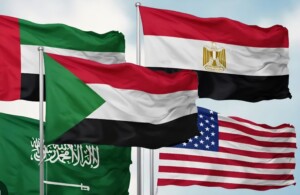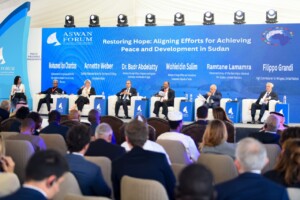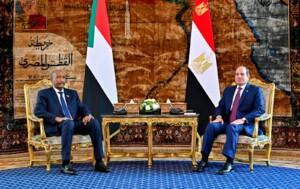Leading member Sudan’s Communist Party: ‘No possibility for real dialogue with military regime’
Economic expert and leading member of the Communist Party of Sudan, Sidgi Kaballo, spoke with Radio Dabanga on Sudan’s revolution, the economic collapse, and the impossibility of finding a sustainable solution in dialogue with the military coup putschists.
 Dr Sidgi Kaballo speaking at the University of Khartoum, November 2013 (Ahmed Kaballo)
Dr Sidgi Kaballo speaking at the University of Khartoum, November 2013 (Ahmed Kaballo)
Economic expert and leading member of the Communist Party of Sudan, Sidgi Kaballo, spoke with Radio Dabanga on Sudan’s revolution, the economic collapse, and the impossibility of finding a sustainable solution in dialogue with the military coup putschists.
Kaballo said that the country has witnessed a collapse in economic conditions and an unprecedented deterioration of living standards within the first hundred days following the October 25 military coup.
In his interview with Radio Dabanga, economist and politician Kaballo said that the most prominent economic effects of the coup were the increases in electricity and bread prices.
Like Economics Professor Dr Hasan Bashir, Kaballo criticised the new National Budget.
He explained, among other things, that the 2022 National Budget depends on an increase in government service fees and tax rates and still suffers from a 10 per cent deficit in total expenditures.
Kaballo further pointed to a significant increase in the Dollar exchange rate, one US Dollar is now worth 520 Sudanese Pounds, and expected it to reach 600 USD.
After the liberalisation of the exchange rate and other economic reforms last year, the Sudanese Pound witnessed a period of stability that lasted for six months, until the coup.
Kaballo expects the authorities to cancel the decision to remove custom taxes on essential commodities and production inputs as this would lead to a significant increase in inflation, which had begun to decline slightly.
Aid and international relations
Concerning the effects of the coup on aid and international relations, Kaballo said that the coup led to the suspension of aid estimated at more than $4 billion from the United States, the World Bank, the African Development Bank, and the International Monetary Fund.
He explained that some of this aid was necessary to reform the electricity sector and infrastructure, support the budget and face the trade balance deficit.
The coup also led to the suspension of the process of writing off Sudan's debts, for which the Sudanese people paid a heavy price. Kaballo expressed his fears that Sudan will return to international and regional isolation.
Kaballo also stressed to the international and regional community that “what is happening in Sudan is not a crisis but a revolution”, and that a revolution does not require mediation or fair solutions. Such negotiations would just delay the explosion of the revolution.
No possibility for real dialogue with military regime
When asked about the best way forwards, Kaballo stressed that he does not see any real possibility to address the economic and political crises in Sudan without overthrowing the military coup regime and establishing a democratic civil authority in the county.
A democratic government should set new economic policies and resume negotiations with the international community on better terms for cooperation.
He stressed the impossibility of dialogue with the current authorities and called on the revolutionary forces to unite and overthrow the regime to pave the way for a new transitional period to establish a true democracy in Sudan.
Regarding the effects of the coup on liberties, Kaballo indicated that at least 80 demonstrators have been killed, more than 2,000 have been injured, a large number of protesters, journalists, lawyers, and other activists have been arrested, and press freedoms were attacked.
He further explained that military authorities have (re-)appointed a ‘second wave’ of the Islamic Movement, and others affiliated with the former regime of dictator Omar Al Bashir, in all service institutions, banks, and justice institutions, something Kaballo described as ‘re-empowerment’*.
Peace agreement issues
He further described the implementation of the Juba Peace Agreement as a difficult process at the moment. Kaballo referred to the continued attacks on civilians, the slow implementation of security and protection arrangements.
He further noted that it is not possible to achieve comprehensive peace without the signature of the Sudan Liberation Movement in Darfur, led by Abdelwahid El Nur, and the Sudan People’s Liberation Movement-North (SPLM-N) in the Nuba Mountains under the leadership of Abdelaziz El Hilu.

Sidgi Kaballo
As an academic and opposition figure, Dr Sidgi Kaballo is not afraid to voice criticism and is no stranger to oppression by authorities. In January 2018 was arrested in Khartoum ahead of a protest against the former regime's disastrous economic policies and was held without charge for months.
Throughout the years, he has often shared his views on economic and political affairs with Radio Dabanga.
* Empowerment (tamkin) is the term with which the Al Bashir regime (1989-2019) supported its affiliates by granting them far-going privileges, including government functions, the setting-up of various companies, and tax exemptions.











 and then
and then